Beginner sewing machines are great for most dressmaking or home sewing projects, but if you want to go pro, tackle tougher fabrics or sew items in larger volumes – an industrial sewing machine could be the answer. With their extra speed, power and durability, they're the top performers of the sewing world.
Are industrial sewing machines worth the investment?
Industrial sewing machines are used by many who sew professionally – from making or altering clothes to offering home sewing and upholstery services, for example making curtains regularly for others.
They can make light work of upholstery fabric and handle a range of tougher fabrics with ease (say hello to sewing leather!) but all this also means it comes with a bigger price tag. Many sewists find it tricky to decide which machine is worth the investment, so we've done the research for you in this guide to the best industrial sewing machines.
We'll talk you through how to choose an industrial sewing machine, run through their main features and benefits and suggest some of our picks of the best industrial sewing machines to get you started.
Before you go shopping, if you're new to sewing and you just want to to make a few clothes or home sewing items for yourself or friends, then you might be better off looking at our roundup of the best sewing machines for beginners.
Jump to our buyers' guide to learn more.
Best industrial sewing machines to buy in 2025
Juki DDL-8700 Straight stitch
Best for speed
SQUIRREL_TEXT_13084369
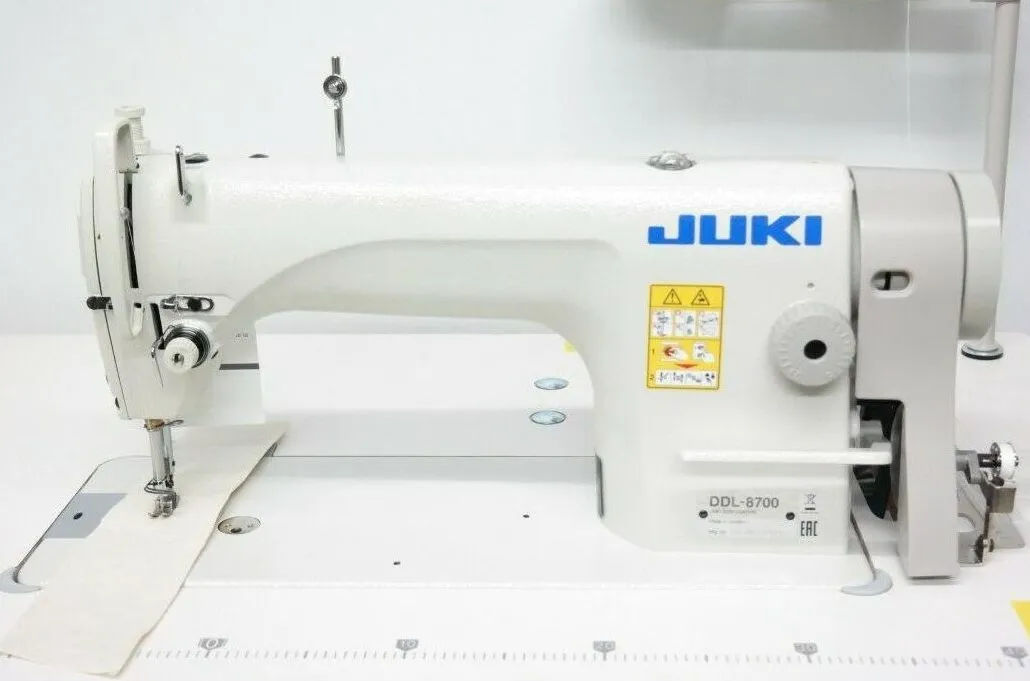
Key specs:
- Dimensions:
- Weight: 28kg
- Stitches per minute: 5,500
- Stitch length: up to 5mm
- Number of stitches: straight stitch and reverse
With its energy saving Servo motor, the Juki DDL-8700 is a nifty piece of kit that won't sound like it's taking off if you're looking to invest in your first industrial sewing machine.
You can easily lift the presser foot by hand or knee which is especially useful for freeing up your hands.
It features a silent Servo motor for low vibration and low noise levels, which you (and the rest of your household) are sure to appreciate!
This is a great value machine, but if you're just starting out and looking for a more affordable model, check out our roundup of the best cheap sewing machines.
Pros: Great value, energy saving, extremely quick and speed adjustable, self oiling, nice and quiet, and nifty presser foot adjustment.
Cons: Not the best for tougher fabrics.
SQUIRREL_1308436
Juki LU-2810-7 Walking Foot Industrial Machine
Best industrial sewing machine for heavy fabrics
SQUIRREL_TEXT_13087515
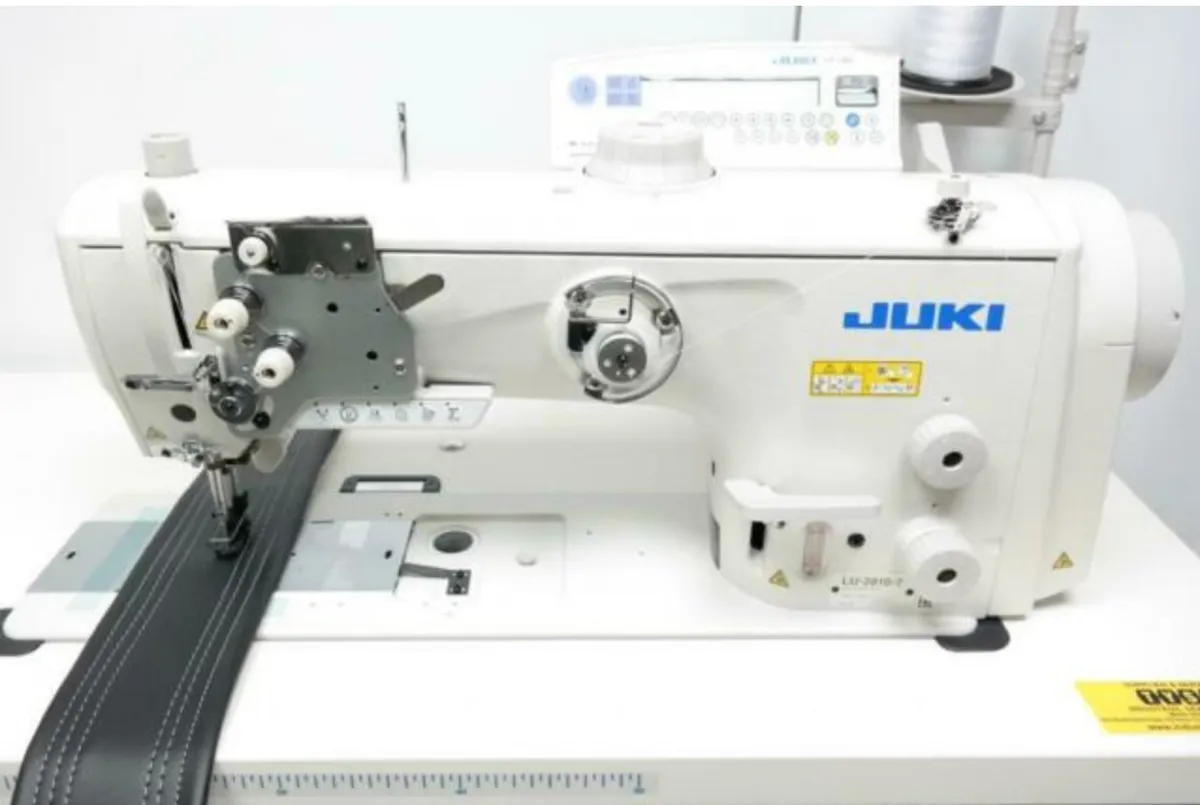
Key specs:
- Dimensions: Not specified
- Weight: 61kg
- Stitches per minute: 3,000
- Stitch length: up to 9mm
- Number of stitches: straight stitch and reverse
Equipped with an energy-efficient electric servo motor, this heavy duty walking foot industrial sewing machine boasts an impressive maximum sewing speed of 3,000 stitches per minute!
It's ideal for heavy-duty materials like denim, leather, and vinyl, offering a maximum stitch length of 9mm.
Check out our roundup of the best sewing machine tables while you're here.
Pros: Very fast, automatic foot lift and thread cutter, can handle tough fabrics, energy efficient electric servo motor.
Cons: On the expensive end of the price spectrum.
SQUIRREL_13087515
SINGER Heavy Duty 4423
Best budget industrial sewing machine
SQUIRREL_TEXT_13084364
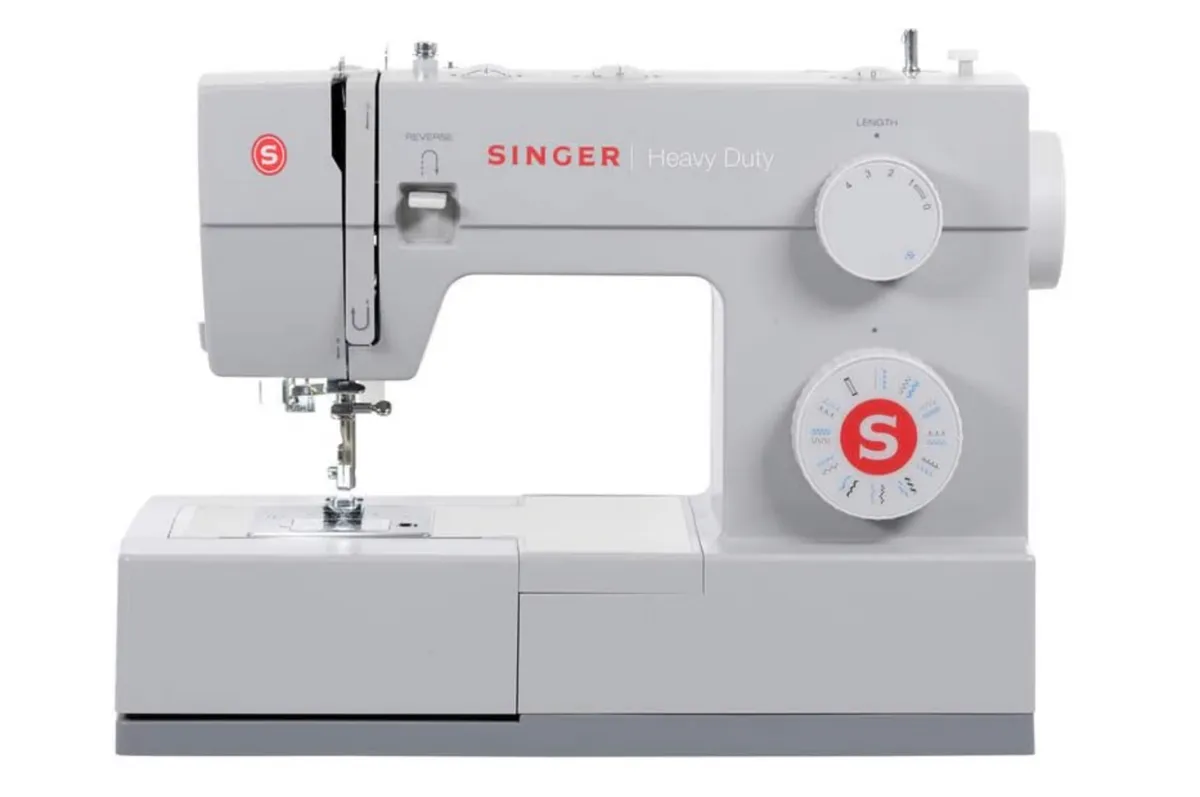
Key specs:
- Dimensions: 16 x 40 x 30.5 cm
- Weight: 6.4kg
- Stitches per minute: 1,100
- Stitch length: up to 6mm
- Number of stitches: 23
Although its technically a heavy duty sewing machine rather than an industrial one, we've included the Singer 4423 because it is still a good option for leather sewing machine on a stricter budget.
Thanks to its heavy duty metal frame and ample power it can sew through heavy weight fabrics without issue.
This sewing machine also comes with 25 Year Limited Warranty so you wont have to worry about being too delicate with it.
Pros: Affordable price, great for leather or thick seams, 1 automatic 1 step buttonhole, automatic needle threader, 25 year warranty.
Cons: Not really an industrial machine, so wouldn't be ideal on a large scale.
SQUIRREL_13084364
Janome HD9 Sewing Machine
Best industrial sewing machine for large projects
SQUIRREL_TEXT_13084366
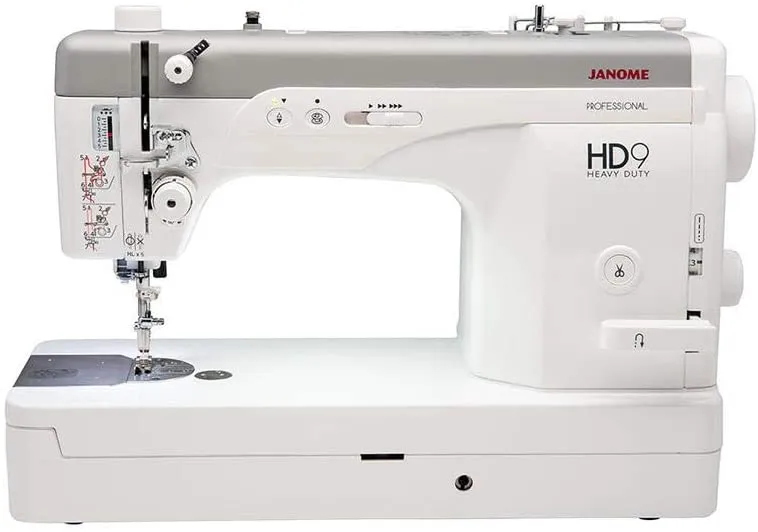
Key specs:
- Dimensions: 49.8 x 33.8 x 21.8cm
- Weight: 14kg
- Stitches per minute: 1,600
- Stitch length: up to 8mm
- Number of stitches: straight stitch
If you're looking for a heavyweight machine to handle upholstery fabric, leather or vinyl, check out this beauty.
The latest in Janome's Professional Series will reward you for your money with a sturdy machine that handles large projects, from quilts to home furnishings and bridal wear, with ease.
Pros: Industrial-sized bobbin holder, heavy weight thread guide, new 'Liquid Response' tension system, extra-large 225 x 140mm work area, can handle tough fabrics, will cover a lot of ground.
Cons: More pricy, not ideal for beginners.
SQUIRREL_13084366
Janome Horizon MC14000 Sewing and Embroidery Machine
Best industrial sewing machine for embroidery & quilting
SQUIRREL_TEXT_13080524
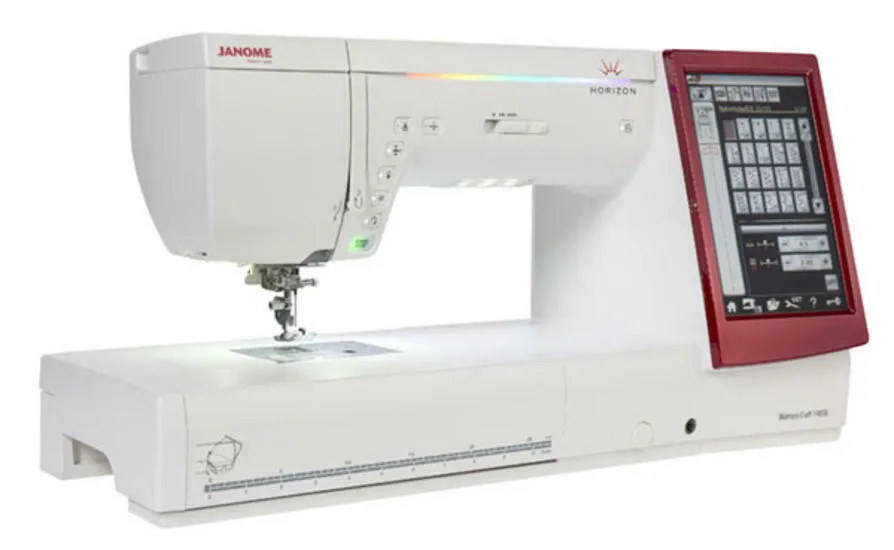
Key specs:
- Dimensions: 65 x 32 x 30 cm
- Weight: 15.6kg
- Stitches per minute: 1,060
- Stitch length: up to 9mm
- Number of stitches: 400
The Janome Horizon MC14000 offers an expansive 280mm working space and a lengthy free arm of almost 260mm, making it ideal for larger projects such as quilts and curtains.
With 10 bright white LED lights in 5 locations and a full-colour LCD display touchscreen, this computerised sewing machine provides excellent visibility and user-friendly controls for both sewing and embroidery enthusiasts.
Don't miss our round up of the best embroidery machines and the best quilting machines while you're here.
Pros: 150mm height sewing area, Acu-View Magnifier, colour LCD display, 400 stitches and 350 designs make it ideal for embroidery and quilting.
Cons: On the expensive end of the spectrum.
SQUIRREL_13080524
Brother RH-9820 Electronic Button Holer
Best industrial sewing machine for buttons
- Buy now from J & B Sewing Machines
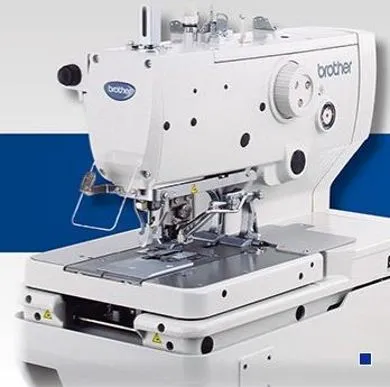
Key specs:
- Dimensions: N/a
- Weight: 120kg
- Stitches per minute: 2,500
- Stitch length: N/a
- Number of stitches: N/a
If you're really serious about making garments professionally, consider a machine which makes light work of sewing precision, neat button holes quickly and efficiently.
For more specific task machines, check out our roundup of the best overlockers.
Pros: Easy to change the needle, specialises in fine finishing of button holes, large arm pocket to allow smooth fabric handling, perfect for if you have a lot of button holes to sew.
Cons: Can only be used for button holes.
Buy now from J & B Sewing Machines.
What is an industrial sewing machine?
An industrial sewing machine is a professional-grade sewing machine that has been designed to handle larger-scale and tougher sewing projects than your regular sewing machine.
Heavy-duty fabrics
While most domestic machines are designed to be multi-taskers which an be used to make clothes or smaller home projects for maybe a few hours at a time, industrial sewing machines have been specially built to handle heavy-duty projects and larger scale sewing.
Durable build
You can use them for longer, and with tougher fabrics, than domestic sewing machines, and they've been built to last so they're less likely to break in the process.
Professional use
They are worth considering if you're looking to start dressmaking for a living or if you want to start making curtains or other chunkier items to sell.
They're also handy if you find you are often sewing thick or tougher materials that your machine struggles to handle – from denim to upholstery fabric – for example if you're making a lot of costumes from specialist fabrics that your current sewing machine struggles with.
What is the difference between an industrial sewing machine and a normal one?
Run-time
You can run an industrial machine for hours on end with less chance of needles snapping or parts breaking. They will go and go so they're the machine of choice if you're after stamina or you're spending many hours every day sewing.
Resilience
While this varies per machine (and you can get different industrial sewing machines that specialise in different fabrics), as a rule of thumb, industrial sewing machines will be able to sew through more layers of fabric, and tougher fabrics, with ease.
Durability
Because they've been designed to be hard-wearing, industrial sewing machines should be more reliable under pressure, and be able to sew in much higher volumes without breaking or needing regular servicing.
Speed
To say industrial machines are nippy is an understatement. They can sew at hugely impressive speeds. You'll whip through jobs in a fraction of the time they'd take on a domestic machine.
Quality
As they've been created for pros, industrial machines offer near perfect stitch quality which would be hard to beat with a regular domestic machine.
Not as portable
While home sewing machines can be pretty easily picked up and transported to friends houses, workshops or moved from room to room of your home, industrial machines are heavier and bulkier and come with a separate motor. So you'll need to pick a space to sew in and commit to it.
Large footprint
As industrial sewing machines are usually larger and heavier than domestic machines, they need more space and a table to house their motor. Before you commit to buy, do you have space for the machine to live? Check the spec before you commit.
Power
Industrial machines have been built with added oomph. The foot pedal of an industrial machine will press with little effort and is hugely powerful. Many sewists find this a bit daunting at first but you'll adjust with practice.
Specialised
If you want a varied multi-tasker, opt for a domestic machine. Industrial machines are often designed to do specific tasks at high volume/speed, really really well – but they may not be as adaptable.
For example they may focus on doing straight stitch, buttonholes or serger stitch, or on handling a specific type of fabric, for example leather or lighter fabrics. As they've been built for this purpose, they're less likely to enjoy being offered a different task. This depends on the machine of course.
What is a walking foot industrial sewing machine?
A walking foot industrial sewing machine has a special foot built into the stitching area that grips the top of your fabric.
Using a walking foot machine ensures your fabric moves smoothly as you sew – as the feed dogs move the bottom layer at the same rate as the top layer.
This reduces the chance of your fabric puckering or shifting as you sew. Walking foot industrial sewing machines are often chosen by quilting businesses, or to topstitch hems or necklines.
They're also the machine of choice if you're sewing knit fabrics as they're designed to stop the chance of your fabric stretching as you stitch.
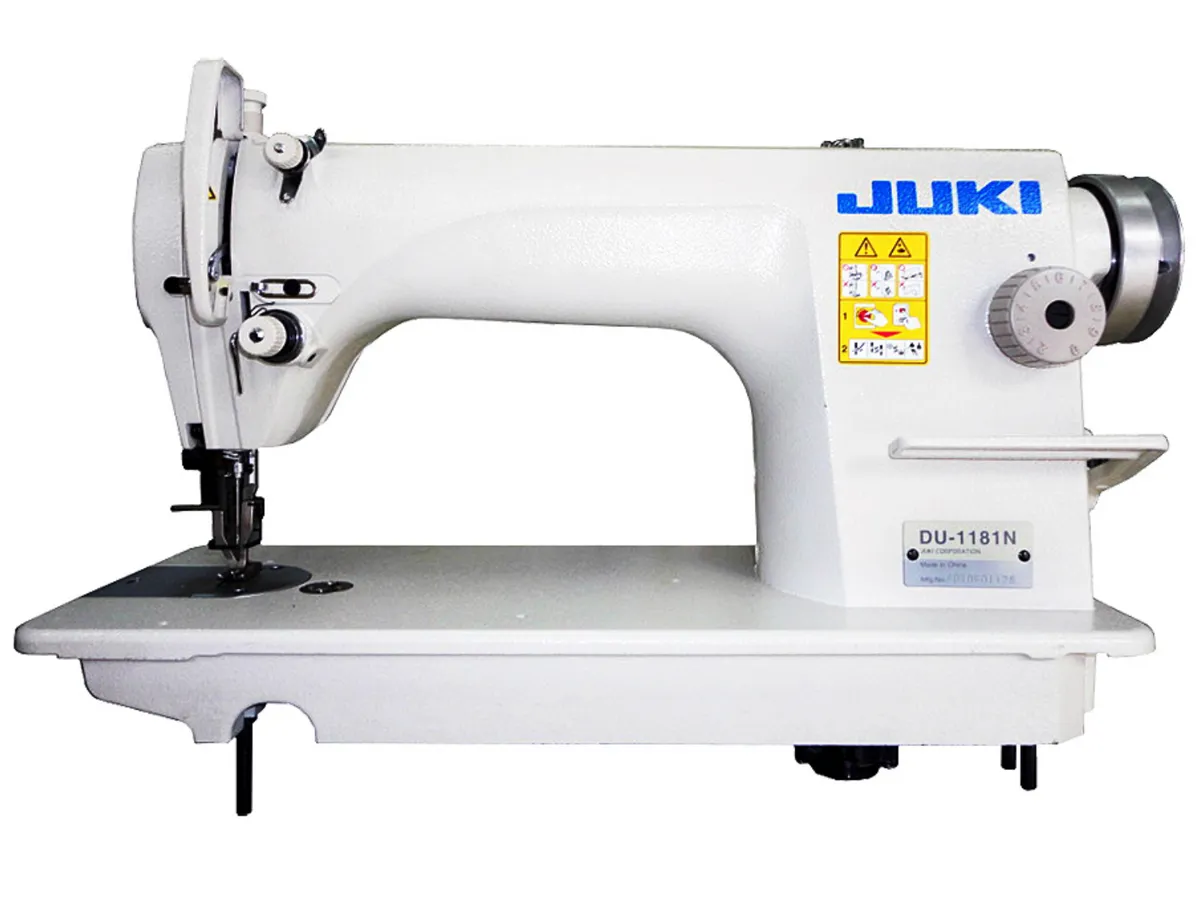
How to choose an industrial sewing machine
We're here to help you find the best industrial sewing machine for your needs – from durability to speed, and price point! Here are our top tips:
Do you need one?
We're not trying to talk you out of it, but if you're only reading this article because your current machine is breaking a lot or you're not getting on with it, the solution may be to find another domestic sewing machine or learn more about the feet and accessories available on your current machine.
However, if you're looking to sew professionally (or you sew ALL the time) then an industrial machine could be worth the investment.
Keep reading if you own a small shop that offers alterations or tailoring, if you offer these services from your own home, you're a designer looking to sew professional garments regularly or perhaps a home sewist who wants to launch your own sewing business.
How much space do you have?
As mentioned above, industrial sewing machines need a special table to house their power-house tech. Make sure you take note of the spec of a potential machine and compare it to your sewing space before you buy.
How much does it cost?
It won't come as a surprise that Industrial machines are more expensive than domestic machines – after all they are professional standard equipment. But there's still variation, depending what brand you pick or what you want the machine to do.
What do you want to use it for?
Industrial sewing machines are ruthlessly-trained sewing machines – they are designed to handle specific tasks in high volume, from straight line sewing to buttonholes or handling heavyweight fabrics.
This means it may potentially be harder for you to use them for different tasks, so it's important to have a strong idea of how you want to use it now (and in the future) to help you choose the right machine.
How loud is it?
Due to their immense power, industrial machines are known to make a bit more noise than domestic models. The type of motor your machine has can make a difference – there are two main types (clutch motors and servo motors).
Clutch motors
Traditional clutch motors can be loud (how old they are can affect their volume, for example, if these motors are wearing out they get louder) but strong and often a favourite for people who want to grapple with tougher materials.
Servo motors
Whereas Servo motors are usually quieter and more suitable to use at home – they also have adjustable speeds and often work better with light or medium fabrics. Check this detail before you buy.
What brand is it?
There are some big players in the sewing machine market so you shouldn't have to look far to find a well-established, trusted brand to buy from. Remember though, the most popular brands of industrial machine may not be the same as the ones you've heard of for beginner or everyday sewing machines.
If you're going to invest in a machine, make sure you're happy with the makers (perhaps do a little research of what other sewists you know recommend first, or check out user reviews online) and consider if the machine comes with a warranty (and how long for) to protect you if anything goes wrong.
What is the best industrial sewing machine brand?
This depends on what you're using them for, but look for a brand name that's known and established for making quality sewing machines.
As a rule of thumb though, the following brands come recommended by fellow sewists.
Why trust Gathered?
Zoe Williams, with over a decade of experience in the craft publishing industry, has collaborated with leading UK craft magazines, such as Today’s Quilter, Love Patchwork & Quilting, Simply Sewing, and written for reputable platforms like radiotimes.com, Simply Knitting and The World of Cross Stitching. Her expertise ensures our recommendations for the best industrial sewing machines are reliable and tailored to meet the needs of enthusiasts and professionals alike.
Stitching success
A sewing machine is an investment, especially on an industrial scale. We hope we've provided you with the necessary tools to evaluate which of the best industrial sewing machines is a perfect fit for you.
Whether you're a professional or a passionate hobbyist, these top-notch machines are sure to elevate your productivity. Now it's your turn to take action and elevate your sewing game!
The best sewing machines for everyone
You can also read our complete guide to the best sewing machines for everything you need to know before purchasing your next, or first-ever, sewing machine.
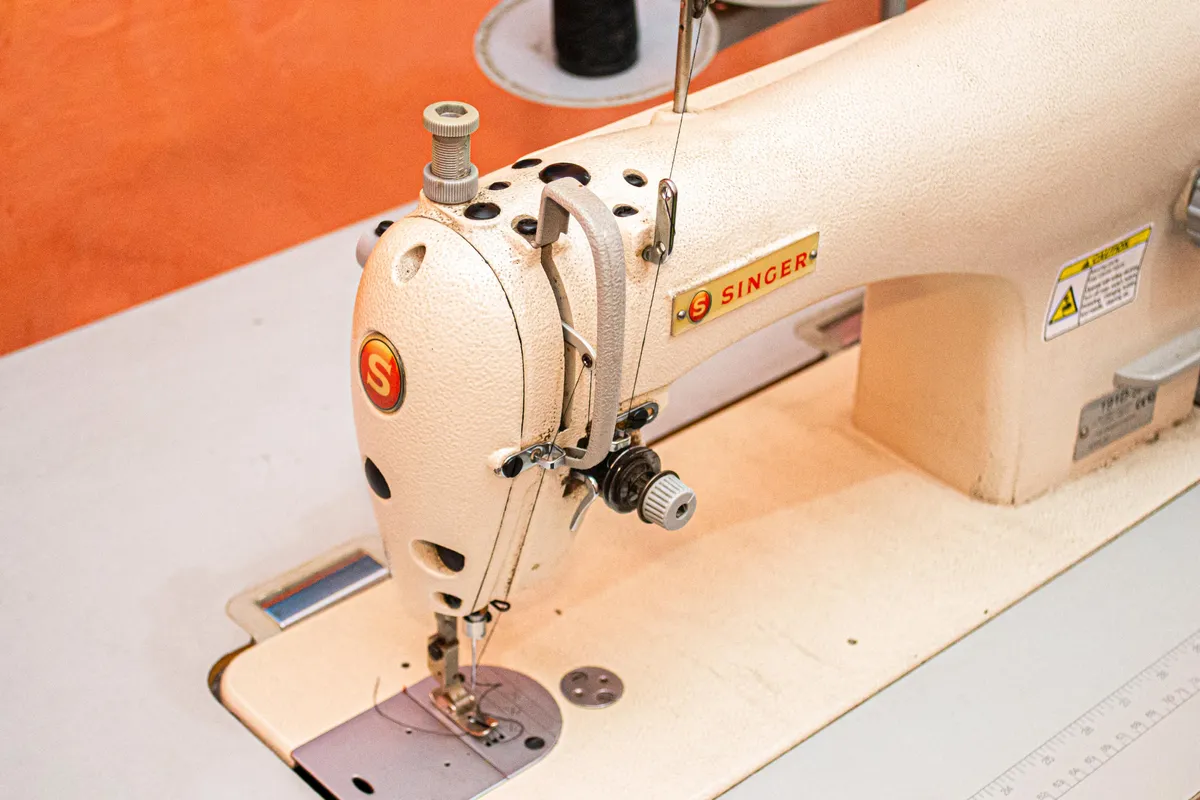
Read more:
